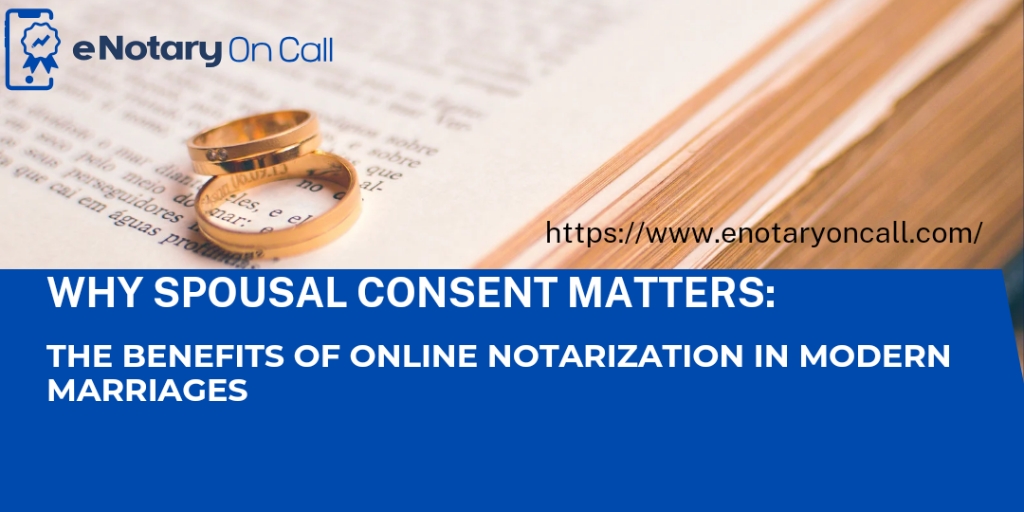Have you ever questioned whether a significant financial decision—like buying a house or taking out a loan—could strain your marriage if not handled collaboratively? You’re not alone.
A National Endowment for Financial Education survey found that 70% of couples who avoid discussing finances report increased relationship stress.
This highlights a common issue: many couples overlook the importance of spousal consent in legal and financial transactions, which can create misunderstandings and conflicts.
For instance, consider a couple, Sarah and John, who bought a home together.
- Sarah, assuming she could handle the purchase without John’s consent, made decisions that ultimately led to disputes over financial responsibility.
- These issues not only affected their relationship but also resulted in financial strain.
Navigating legal matters—especially in marriage—requires a proactive approach to communication and consent. Online notarization has emerged as a powerful tool to streamline the process of obtaining spousal consent, making it easier for couples to work together and avoid potential pitfalls.
In this blog post, we will delve into the significance of spousal consent and explore how online notarization enhances this essential aspect of marital life.
Spousal Consent: What & Why?
Spousal consent refers to the agreement and acknowledgment of one spouse regarding decisions that significantly impact the other’s rights, interests, or financial obligations. It is vital in various situations, including:
- Property Transactions: When purchasing or selling property, especially in community property states, spousal consent is often legally required.
- Financial Decisions: Joint bank accounts, loans, and investments typically necessitate both partners’ approval to protect each individual’s economic interests.
- Legal Agreements: Contracts such as prenuptial agreements or business ventures require spouses to participate in decision-making to ensure fairness and clarity.
Why Spousal Consent Matters?
The following are some reasons: –
- Legal Protection:
Spousal consent is crucial for ensuring that both parties are informed and agree to significant decisions, thus safeguarding their legal rights and interests.
A study from the American Academy of Matrimonial Lawyers found that about 65% of divorce cases involve financial disputes arising from misunderstandings regarding consent and agreements.
- Transparency and Trust:
Open communication regarding financial matters and legal agreements fosters trust and transparency between spouses.
According to a survey by the National Endowment for Financial Education, 70% of couples who discuss finances report a more substantial relationship than those who do not. This proactive approach helps avoid misunderstandings and conflicts in the future.
- Enhanced Financial Security:
By ensuring both spouses consent to major financial decisions, couples can create a more stable financial future. For instance, properties acquired during the marriage are usually considered joint assets.
According to a study by the Institute for Financial Literacy, couples who practice joint financial decision-making report higher savings rates, with an average of 20% more savings than those who do not.
- Equity in Decision-Making:
Consent emphasizes equality in the relationship, allowing both partners to participate in decisions that impact their lives.
A survey from the American Psychological Association revealed that couples who practice mutual decision-making are 45% less likely to experience conflict in their relationships.
The Role of Online Notarization in Spousal Consent
Online notarization facilitates spousal consent, offering a modern, efficient alternative to traditional notarization. Here are some key benefits of online notarization from a spousal consent perspective:
- Convenience and Accessibility:
Couples can easily access notary services without the need to travel to a physical location. This is particularly advantageous for busy couples or those living in remote areas. According to a report by the National Notary Association, 80% of respondents cited convenience as the primary reason for choosing online notarization.
- Faster Processing Times:
Online notarization significantly reduces the time it takes to notarize documents. Couples can often complete the process within minutes instead of hours or days for in-person notarization.
- Increased Security:
Many online notarization platforms like eNotary On Call employ advanced security measures, such as encryption and multi-factor authentication, to protect sensitive information. This ensures that both spouses’ rights and data are safeguarded during notarization.
- Document Integrity:
Digital notaries utilize electronic seals and signatures, enhancing the authenticity and integrity of notarized documents. This reduces the risk of fraud and provides both parties with a clear, verifiable record of their consent.
- Greater Flexibility:
Online notarization allows couples to choose when and where to finalize documents, making it easier for those with conflicting schedules or who are in different locations. This flexibility is particularly beneficial for military couples or those who travel frequently for work.
Also read – Why eNotary On Call Is the Ultimate Solution for Your Notary Business?
The Process of Online Notarization for Spousal Consent
The process of obtaining spousal consent through online notarization typically involves the following steps:
- Choose an Online Notary Platform: Couples can select a reputable online notary service like eNotary On Call that meets their needs. Look for platforms that offer secure connections and positive user reviews.
- Prepare Required Documents: Gather all necessary documents requiring notarization, such as property agreements, financial consent forms, or other relevant legal documents.
- Schedule a Video Appointment: Couples can book an appointment with a licensed online notary, typically via video call, at a time that works for both parties.
- Verify Identity: During the appointment, both spouses must verify their identities, usually by providing government-issued identification and possibly answering security questions.
- Review and Sign Documents: The notary will guide the couple through the signing process, ensuring both parties understand the contents of the documents before providing their consent.
- Receive Notarized Copies: After the documents are signed, the notary will provide electronic copies of the notarized documents, which can be stored securely or printed as needed.
Conclusion
Spousal consent protects each partner’s rights in modern marriages and fosters trust. Online notarization offers a convenient and secure way for couples to obtain this consent, ensuring informed decision-making in legal and financial matters. As you adopt these digital solutions, consider leveraging eNotary On Call to simplify the notarization process and strengthen your partnership. Protect your interests and enhance your relationship—get started today!



